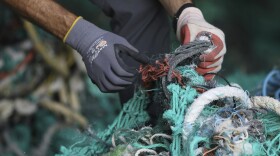Hawaii lawmakers heard from election officials on Wednesday about efforts to move to mail ballot elections next year starting with the August primary, a transition that some legislators and community groups worry might cause problems for voters.
Under a vote-by-mail law signed by Gov. David Ige earlier this year, residents won't go to neighborhood polling places to cast ballots as they have for decades. Instead, registered voters will receive mail ballots about 18 days before the election dates. They must fill out the ballots and return them early enough to arrive at their county clerk's office by 7 p.m. on election day to be counted.
Officials plan to open a limited number of voting centers as required by federal law, allowing residents to cast their ballots in person if they choose. Voters can also deposit their completed mail ballots in drop boxes around the state.
The new mail-in system is aimed at raising Hawaii's voter turnout rates, which are among the lowest in the country. The mail voting will also save an estimated $750,000 for each election since poll workers won't need to be hired.
But preparation will be key in ensuring voters can properly cast their ballots, lawmakers were told.
“There needs to be an adequate number of voting centers and drop boxes in the state in convenient locations with extended hours on all islands,” said Sandy Ma, executive director of Common Cause Hawaii. “This is especially true given this is the first time Hawaii will be implementing vote-by-mail throughout the state.”
Colin Whited, a representative from the state Department of Health’s Disability and Communication Access Board, also pointed out that Lanai would have no voting centers, which he said could put the state in violation of federal law.
State Chief Election Officer Scott Nago did not comment on Whited's remark during the briefing.
Lawmakers also asked repeatedly about plans to check on voters by verifying the signatures officials will have on file with the signatures required on the back of ballot return envelopes. If voters don't sign their return envelopes, their ballot won't be counted.
In April 2020, the state will be mailing out requests for signatures to use in verifying the ballots.However, each county is responsible for collecting the ballots and verifying the signatures on the return envelopes.
The counties' processes for verifying signatures vary. For example, on Oahu and Hawaii Island, a high-speed machine will complete the initial verification and a person will then check the ballots that the machine deems questionable.
On Kauai, all the ballot signatures will be verified by hand, as has been done in past elections.
Nago also cautioned that the public and lawmakers should not expect to see earlier returns on the results.
“Just because everybody’s voting by mail, the expectation of faster results is unrealistic,” he said. “Drop boxes, voter service centers, all those things need to be processed and they won’t be processed until after 7 p.m. because that’s when it [balloting] closes.”
The state Office of Elections has a frequently asked questions page on its website on voting by mail.




